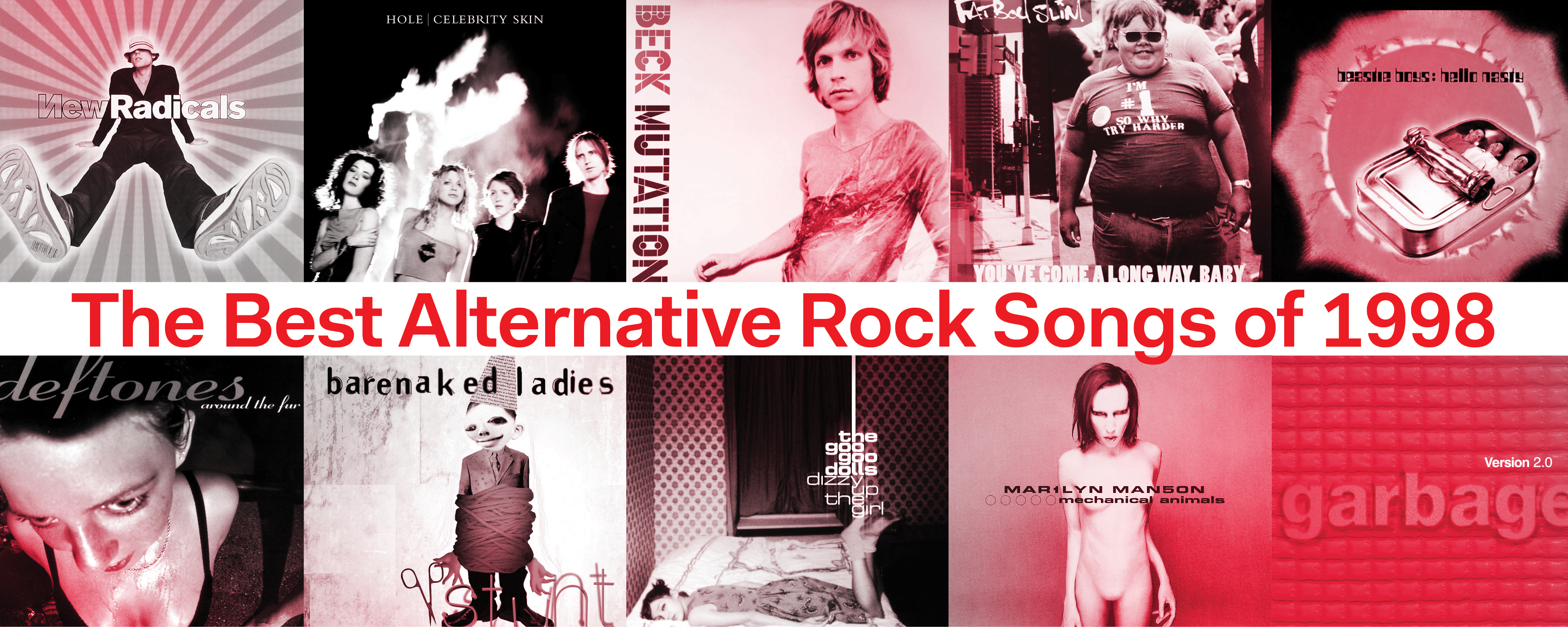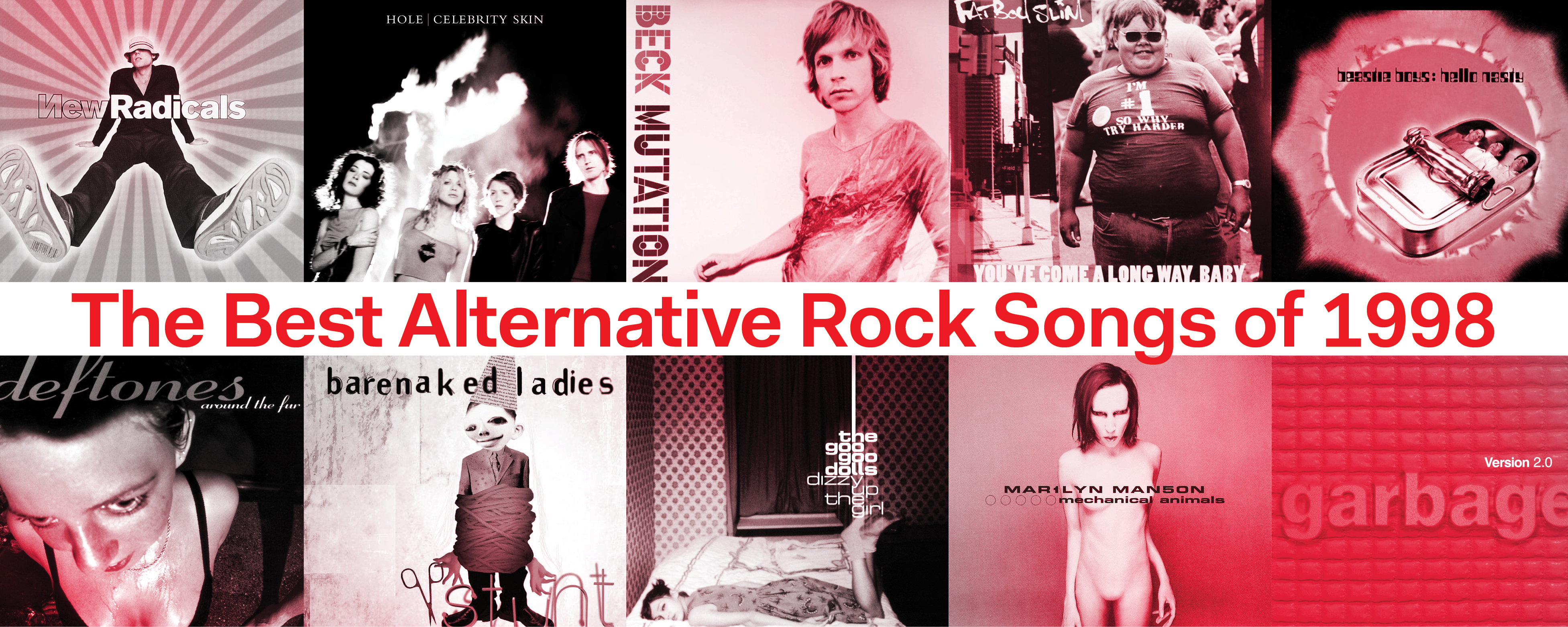70. Limp Bizkit – “Faith”
Limp Bizkit’s label apparently paid to get “Counterfeit,” their first major single, into radio rotation, but it didn’t quite take. What audiences really needed to come to terms with this band was a weird, half-assed Trojan horse, in the form of an ironic pop cover. Their feral version of George Michael’s 1987 hit “Faith” illustrates the extent to which this movement-of-sorts was not about the rap or the rock as much as a specific and brain-dead anti-authoritarian energy. The incongruity of this band of modern-day Floridian Stanley Kowalskis blowing their amps and vocal chords on a skill-free cover of a jangling tune by a butt-waggling pop star was intended as some form of absurdist subversion—a statement about nothing. The one-off track—perfect for a standalone Napster download—gave Fred Durst and the gang a platform to do pretty much whatever they wanted to do for the next couple of years. (Shortly after the release of the single, Durst was pontificating about creating Limp Bizkit’s version of The Wall on the Family Values Tour.) Significant Other, the band’s sprawling and hit-packed major statement, came the following summer. “Faith” was an undercooked first bake of the cookie that the world would eventually stick up our collective “yeah.” —WCW
69. Oasis – “Acquiesce”
Universally acknowledged as the best Oasis B-side, “Acquiesce” dates to the era of 1995’s (What’s the Story) Morning Glory, when it backed up album single “Some Might Say.” But with a riff bigger than its A-side and a chorus anthemic enough to rival “Live Forever,” “Acquiesce” hit American radio in 1998, leading Oasis’s best-kept secret, the B-side compilation The Masterplan. Naturally, it’s tempting to read that big ol’ “we buh-lieve in one another” as a rare message of camaraderie from the Gallagher brothers, who seldom shared vocals on record and to this day can barely stand to cohabitate our collective memory. Allow Noel to put a fork in the actually-they-love-each-other theory for you: “Total fucking bullshit.” —ANNA GACA

Also Read
The Year in 1998 Alternative Rock
68. The Verve – “Lucky Man”
Never mind that they released an excellent shoegaze debut, A Storm in Heaven, in 1993—The Verve never got any shine in the U.S. before “Bitter Sweet Symphony,” which is also probably their only song anyone who’s not a devoted listener still remembers. That’s a shame, because Urban Hymns was filled with moments of gorgeous introspection, melancholy, and gratitude. Take “Lucky Man,” which finds frontman Richard Ashcroft’s nimble voice enumerating the blessings of love and the fragility of human emotions. There’s still a sense of grandness here: the track ramps up, in its final half, from a modest acoustic ballad to a soaring, string-backed hymn. It’s not quite a symphony, but not every great song needs to be. –JB
67. Local H – “All the Kids Are Right”
This self-sendup contains more than a little false modesty: for more than 30 years now, Local H have prided themselves on giving ticketbuyers their money’s worth. The title of “All the Kids Are Right” transposes a Who cliche, while the power-pop form nods to another incendiary (if frequently shambolic) live act: the Replacements. “You hoped that we would rock/And knock it up a notch,” frontman Scott Lucas ruefully notes, “Rockin’ was nowhere in sight.” The chorus, with its images of angry kids tearing into the band online, is unusually prescient. —BS
66. Fiona Apple – “Across the Universe”
One of the Beatles’ loopier meditations, “Across the Universe” has been covered by artists from David Bowie to Rufus Wainwright to the kids in a certain best-forgotten movie, all acoustic and relatively faithful. Fiona Apple’s cover, for the Pleasantville soundtrack, isn’t un-faithful—particularly the first few fakeout seconds—but the rest is like she swapped out Lennon’s psychedelics for narcotics. Twenty years have passed, and slowcore covers of pop songs are now cliche bummer, but Apple’s version works because it’s more ambiguous than obvious. Apple’s hazy setting brings out the torch-singer styling lurking below Lennon’s vocal twinge, and the unsettledness of the melodic line. The words really do flow out. She slurs her way through the “jai guru” mantra, and the most straightforward lines, making “nothing’s gonna change my world” sound less enlightened than resigned. —KSA
65. Chris Cornell – “Sunshower”
Euphoria Morning, the lone album Chris Cornell released between the initial collapse of Soundgarden in 1997 and the formation of Audioslave in 2001, gave the singer a chance to further explore his mellow side, which he’d begun to do on the last couple of Soundgarden albums. “Sunshower,” a bonus track that became a minor hit, was even gentler than Soundgarden’s swan song Down on the Upside. Cornell sang about finding the bright spots during difficult times, and his unmistakable soulful delivery conveyed the sense that the process is generally easier said than done. Cornell’s sense of pained searching, and the cascading instrumental interplay of his band, make one thing clear: the guitars may be a little quieter than usual, but this is still heavy music. —AC
64. Pearl Jam – “Given to Fly”
Based on Pearl Jam’s reputation five albums in, listeners might’ve called the first Yield single “Given to Frown.” But after the difficulties of previous album leaders like Vitalogy‘s “Spin the Black Circle” and No Code‘s “Who You Are,” the eagerness to please of Yield’s “Given to Fly” was a seismic shock. Co-writer Mike McCready says he wrote the pretty Zeppelin-indebted chord progression during a rare Seattle snow day. It’s the way the guitars sparkle before the abrupt release of the chorus that creates the impression of sunlight dispelling gloom. Peaking at #21 and a live stalwart, “Given to Fly” is one of the few Pearl Jam songs you might reasonably describe as “buoyant.” —ALFRED SOTO
63. Dave Matthews Band – “Don’t Drink the Water”
Dave Matthews Band’s “Don’t Drink the Water” is a showcase for the band’s more somber side. It’s more serious than the goofy jam-band kitsch of “What Would You Say” or the saccharine sexytime nostalgia of “Crash Into You,” serving as an indictment of colonialism and the displacement of indigenous populations, as influenced by Matthews’s native South Africa as it was by his adopted home in the United States. The subject matter, of course, doesn’t mean Dave doesn’t still sound like Dave: with appearances by both Alanis Morisette and banjo virtuoso Béla Fleck, it’s right in line with DMB’s hybrid of adult contemporary pop and slapstick Americana. —TAYLOR BERMAN
62. Lenny Kravitz – “Fly Away”
Known elsewhere for his pastiches of artists like Jimi Hendrix and Prince—kinda like the ‘90s version of Bruno Mars, with whom he’s played—Lenny Kravitz is more himself on “Fly Away.” Or, rather, he doesn’t mimic any particular artist, but rather rock itself, in slab form, with a guitar riff that doesn’t fly anywhere but thinks that maybe if it heaves at the air enough it’ll get off the ground. There’s some lite funk to the bass burbles, and more than a little ridiculousness to lyrics like “the Milky Way, or even Mars.” It takes confidence to pull it all off, but Kravitz has it. —KSA
61. Green Day – “Redundant”
Green Day first became classic rock by default: “Longview,” “Basket Case” and “When I Come Around” were ubiquitous and beloved enough to be grandfathered into formats with the Clash, U2, and the Who in perpetuity. The second time Green Day became classic rock, they did so by channeling those exact bands on American Idiot and riding the respect that album afforded them into Rock and Roll Hall of Fame in 2015. During the underappreciated phase in between, they drew on classic rock without being recognized as such. The era is best represented by “Redundant,” a slumped sadsack pop song that is just as referential of the Kinks as it is Green Day’s own “Pulling Teeth.” This time, the guitars are run through a Leslie speaker cabinet, which they probably would’ve stolen and sold for about 24 months rent back in 1993. —IC




